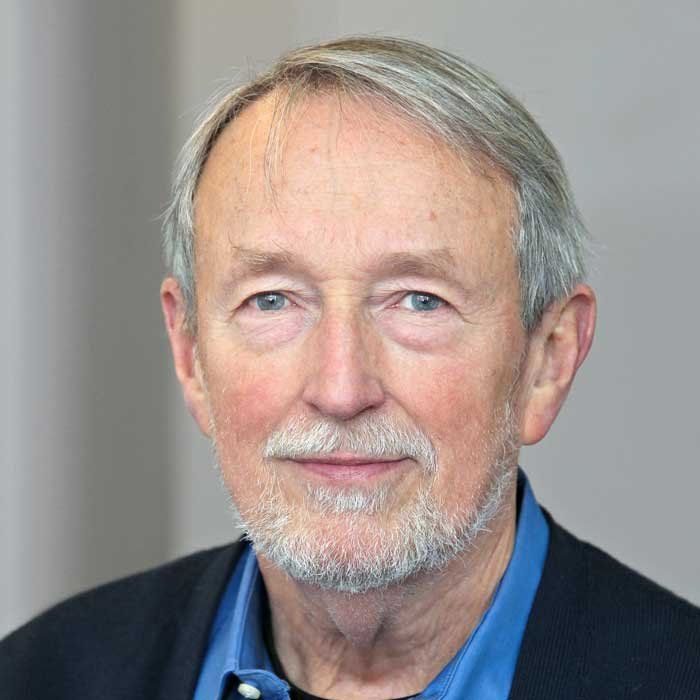 Henry Bourne (1940-2023)
Henry Bourne (1940-2023)
Henry Bourne, MD, a long-time researcher at UC San Francisco who chronicled its rise to prominence in the 1970s, has died at the age of 83. A member of the National Academy of Sciences, Bourne made significant contributions to understanding how cells send their signals to one another. But he is equally remembered for the curiosity and passion that he brought into the laboratory and the campus research community.
Bourne not only recruited promising students, post-docs, and faculty members to UCSF, particularly when he was department chair, but also gave his fellow scientists the encouragement they needed to persist and even thrive through the difficulties they would inevitably face. “It was impossible not to get swept up in his infectious enthusiasm,” said Orion Weiner, PhD, a professor in the UCSF Cardiovascular Research Institute who was mentored by Bourne from 1995-2001. “He helped us believe that even very ambitious projects were possible, and with his creativity and insight, they usually were.”
Bourne arrived at UCSF in 1969 armed with a medical degree, research experience at the National Institutes of Health, and several years of experience as a journalist. With a knack both for exploring the molecular communication between cells and for communicating his findings with colleagues at UCSF and beyond, he quickly earned the admiration of his peers and students. He was welcomed into the faculty of the School of Medicine in 1971.
“He was fascinated by the ways that the cells in our tissues talk to each other and control each other’s behavior in response to various changes in their environment,” said colleague David Morgan, PhD, vice dean for research at UCSF’s School of Medicine. “But he was bigger than his science and brought an unforgettable spirit to our campus. No matter the topic, he spoke his mind – without filters – about the issues he was passionate about, often in colorful language.”
Bourne’s research interests began with influential studies on G-protein coupled signaling and, as his career progressed, he moved into studies on cellular pathfinding in the body, or chemotaxis. Over nearly 40 years as a researcher, Bourne authored more than 150 primary journal articles and 95 book chapters, and earned 17 awards from professional organizations, including induction into the National Academy of Sciences in 1994 and the American Association for the Advancement of Science in 1996. He chaired the UCSF Department of Pharmacology from 1983-1994.
Bourne was also happy to share his non-scientific interests with his colleagues. After musing about scientists and their relationship with literature, he posted signs around several research buildings inviting people to join him in a book club. “Over 30 people showed up to read Ulysses together,” recalled Dyche Mullins, PhD, professor in the Department of Cellular and Molecular Pharmacology, who met Bourne when he was considering whether to join the University as a post-doc. “Grad students and post-docs and professors came and attended for weeks, all people who felt like they needed something outside of science to sustain them.”
After shuttering his lab in 2005 and becoming an emeritus faculty member in 2008, Bourne returned to his first love – writing – and published several books, including a 2009 memoir of his life in science, Ambition and Delight, and a 2017 institutional history of UCSF, Paths to Innovation, which chronicled UCSF’s ascent from a regional medical institution to an internationally recognized leader in biomedical research. “It’s a book that describes how very important discoveries were made over a period of eight years, in the 1970s, within a diameter of 150 yards, by four different people, three of whom won Nobel prizes,” Bourne said in 2011 upon the book’s publication.
Those scientific luminaries – J. Michael Bishop, MD, Harold Varmus, MD, Herbert Boyer, PhD, and Stanley Prusiner, MD – inspired a young Bourne to carry out a lifetime of innovation in the sciences. And Bourne, in turn, spent his later years advocating for change in the education of young scientists. He penned articles, narrated a video, and dedicated his final book, Follow the Money, to these ideas, which centered on setting up young PhDs for success in academia – primarily by refocusing graduate programs on preparing students for scientific careers. “He took his role as elder statesman seriously,” said Mullins. “He had seen the way the University operated for the last 30 years and had strong opinions on what worked or didn’t, always meant in the spirit of keeping UCSF an innovative and dynamic and top-notch institution.”
Bourne, who died on April 15, leaves behind two sons, Michael and Randy, and a daughter, Margaret, as well as five grandchildren.
